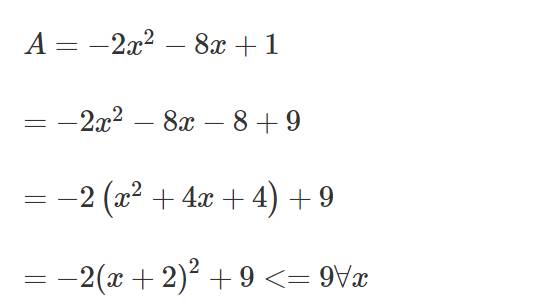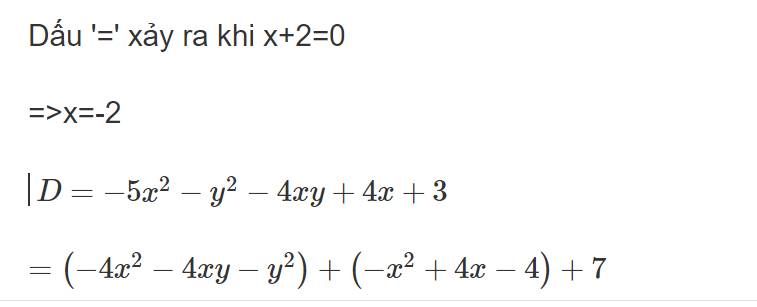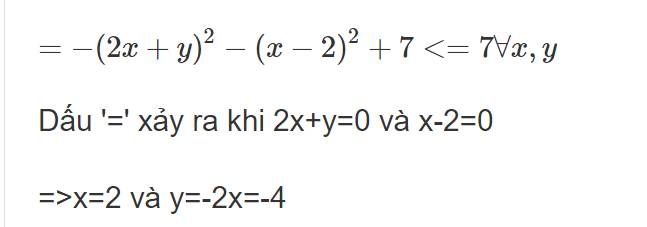Hãy nhập câu hỏi của bạn vào đây, nếu là tài khoản VIP, bạn sẽ được ưu tiên trả lời.

Tìm min:
$F=3x^2+x-2=3(x^2+\frac{x}{3})-2$
$=3[x^2+\frac{x}{3}+(\frac{1}{6})^2]-\frac{25}{12}$
$=3(x+\frac{1}{6})^2-\frac{25}{12}\geq \frac{-25}{12}$
Vậy $F_{\min}=\frac{-25}{12}$. Giá trị này đạt tại $x+\frac{1}{6}=0$
$\Leftrightarrow x=\frac{-1}{6}$
Tìm min
$G=4x^2+2x-1=(2x)^2+2.2x.\frac{1}{2}+(\frac{1}{2})^2-\frac{5}{4}$
$=(2x+\frac{1}{2})^2-\frac{5}{4}\geq 0-\frac{5}{4}=\frac{-5}{4}$ (do $(2x+\frac{1}{2})^2\geq 0$ với mọi $x$)
Vậy $G_{\min}=\frac{-5}{4}$. Giá trị này đạt tại $2x+\frac{1}{2}=0$
$\Leftrightarrow x=\frac{-1}{4}$

a: Ta có: \(\left(3x+5\right)^2-4x^2=0\)
\(\Leftrightarrow\left(3x+5+2x\right)\left(3x+5-2x\right)=0\)
\(\Leftrightarrow\left(x+1\right)\left(x+5\right)=0\)
\(\Leftrightarrow\left[{}\begin{matrix}x=-1\\x=-5\end{matrix}\right.\)

\(1,\\ a,A=4x^2\left(-3x^2+1\right)+6x^2\left(2x^2-1\right)+x^2\\ A=-12x^4+4x^2+12x^2-6x^2+x^2=-x^2=-\left(-1\right)^2=-1\\ b,B=x^2\left(-2y^3-2y^2+1\right)-2y^2\left(x^2y+x^2\right)\\ B=-2x^2y^3-2x^2y^2+x^2-2x^2y^3-2x^2y^2\\ B=-4x^2y^3-4x^2y^2+x^2\\ B=-4\left(0,5\right)^2\left(-\dfrac{1}{2}\right)^3-4\left(0,5\right)^2\left(-\dfrac{1}{2}\right)^2+\left(0,5\right)^2\\ B=\dfrac{1}{8}-\dfrac{1}{4}+\dfrac{1}{4}=\dfrac{1}{8}\)
\(2,\\ a,\Leftrightarrow10x-16-12x+15=12x-16+11\\ \Leftrightarrow-14x=-4\\ \Leftrightarrow x=\dfrac{2}{7}\\ b,\Leftrightarrow12x^2-4x^3+3x^3-12x^2=8\\ \Leftrightarrow-x^3=8=-2^3\\ \Leftrightarrow x=2\\ c,\Leftrightarrow4x^2\left(4x-2\right)-x^3+8x^2=15\\ \Leftrightarrow16x^3-8x^2-x^3+8x^2=15\\ \Leftrightarrow15x^3=15\\ \Leftrightarrow x^3=1\Leftrightarrow x=1\)

\(a,3\left(2x-3\right)+2\left(2-x\right)=-3\\ \Leftrightarrow6x-9+4-2x=-3\\ \Leftrightarrow4x=2\\ \Leftrightarrow x=\dfrac{1}{2}\\ b,x\left(5-2x\right)+2x\left(x-1\right)=13\\ \Leftrightarrow5x-2x^2+2x^2-2x=13\\ \Leftrightarrow3x=13\\ \Leftrightarrow x=\dfrac{13}{3}\\ c,5x\left(x-1\right)-\left(x+2\right)\left(5x-7\right)=6\\ \Leftrightarrow5x^2-5x-5x^2-3x+14=6\\ \Leftrightarrow-8x=-8\\ \Leftrightarrow x=1\\ d,3x\left(2x+3\right)-\left(2x+5\right)\left(3x-2\right)=8\\ \Leftrightarrow6x^2+9x-6x^2-11x+10=8\\ \Leftrightarrow-2x=-2\\ \Leftrightarrow x=1\)
\(e,2\left(5x-8\right)-3\left(4x-5\right)=4\left(3x-4\right)+11\\ \Leftrightarrow10x-16-12x+15=12x-16+11\\ \Leftrightarrow-14x=-4\\ \Leftrightarrow x=\dfrac{2}{7}\\ f,2x\left(6x-2x^2\right)+3x^2\left(x-4\right)=8\\ \Leftrightarrow12x^2-4x^3+3x^3-12x^2=8\\ \Leftrightarrow-x^3-8=0\\ \Leftrightarrow-\left(x^3+8\right)=0\\ \Leftrightarrow-\left(x+2\right)\left(x^2-2x+4\right)=0\\ \Leftrightarrow\left[{}\begin{matrix}x=-2\\x\in\varnothing\left(x^2-2x+4=\left(x-1\right)^2+3>0\right)\end{matrix}\right.\)
Bài 4:
a: Ta có: \(3\left(2x-3\right)-2\left(x-2\right)=-3\)
\(\Leftrightarrow6x-9-2x+4=-3\)
\(\Leftrightarrow4x=2\)
hay \(x=\dfrac{1}{2}\)
b: Ta có: \(x\left(5-2x\right)+2x\left(x-1\right)=13\)
\(\Leftrightarrow5x-2x^2+2x^2-2x=13\)
\(\Leftrightarrow3x=13\)
hay \(x=\dfrac{13}{3}\)
c: Ta có: \(5x\left(x-1\right)-\left(x+2\right)\left(5x-7\right)=6\)
\(\Leftrightarrow5x^2-5x-5x^2+7x-10x+14=6\)
\(\Leftrightarrow-8x=-8\)
hay x=1

\(B=3x^2+3x-1\)
\(=3\left(x^2+x-\dfrac{1}{3}\right)\)
\(=3\left(x^2+x+\dfrac{1}{4}-\dfrac{7}{12}\right)\)
\(=3\left(x+\dfrac{1}{2}\right)^2-\dfrac{7}{4}>=-\dfrac{7}{4}\forall x\)
Dấu '=' xảy ra khi x+1/2=0
=>\(x=-\dfrac{1}{2}\)
\(C=-2x^2+7x+3\)
\(=-2\left(x^2-\dfrac{7}{2}x-\dfrac{3}{2}\right)\)
\(=-2\left(x^2-2\cdot x\cdot\dfrac{7}{4}+\dfrac{49}{16}-\dfrac{73}{16}\right)\)
\(=-2\left(x-\dfrac{7}{4}\right)^2+\dfrac{73}{8}< =\dfrac{73}{8}\forall x\)
Dấu '=' xảy ra khi x-7/4=0
=>x=7/4




c: \(\Leftrightarrow\left(x-5\right)\left(x+1\right)=0\)
\(\Leftrightarrow\left[{}\begin{matrix}x=5\\x=-1\end{matrix}\right.\)

a) \(\left(x+3\right)\left(x+1\right)-x\left(x-5\right)=11\)
\(\Leftrightarrow x^2+x+3x+3-x^2+5x=11\)
\(\Leftrightarrow9x+3=11\)
\(\Leftrightarrow9x=11-3\)
\(\Leftrightarrow9x=8\)
\(\Leftrightarrow x=\dfrac{8}{9}\)
b) \(\left(8x+2\right)\left(1-3x\right)+\left(6x-1\right)\left(4x-10\right)=-50\)
\(\Leftrightarrow\left(8x-24x^2+2-6x\right)+\left(24x^2-60x-4x+10\right)=-50\)
\(\Leftrightarrow2x-24x^2+2+24x^2-64x+10=-50\)
\(\Leftrightarrow-62x+12=-50\)
\(\Leftrightarrow-62x=-50-12\)
\(\Leftrightarrow-62x=-62\)
\(\Leftrightarrow x=\dfrac{-62}{-62}\)
\(\Leftrightarrow x=1\)
a) \(\left(x+3\right)\left(x+1\right)-x\left(x-5\right)=11\)
\(x^2+x+3x+3-x^2+5x=11\)
\(x+8x+3=11\)
\(x+8x=8\)
\(x\left(8+1\right)=8\)
\(x=\dfrac{8}{9}\)
b) \(\left(8x+2\right)\left(1-3x\right)+\left(6x-1\right)\left(4x-10\right)=-50\)
\(8x-24x^2+2-6x+24x^2-60x-4x+10=-50\)
\(-62x+12=-50\)
\(-62x=-62\)
\(x=1\)

Rút gọn hết ta được :
a/ 41x - 17 = -21
=> 41x = -4 => x = 4/41
b/ 34x - 17 = 0
=> 34x = 17
=> x = 17/34 = 1/2
c/ 19x + 56 = 52
=> 19x = -4
=> x = -4/19
d/ 20x2 - 16x - 34 = 10x2 + 3x - 34
=> 10x2 - 19x = 0
=> x(10x - 19) = 0
=> x = 0
hoặc 10x - 19 = 0 => 10x = 19 => x = 19/10
Vậy x = 0 ; x = 19/10
Rút gọn hết ta được :
a/ 41x - 17 = -21
=> 41x = -4 => x = 4/41
b/ 34x - 17 = 0
=> 34x = 17
=> x = 17/34 = 1/2
c/ 19x + 56 = 52
=> 19x = -4
=> x = -4/19
d/ 20x 2 - 16x - 34 = 10x 2 + 3x - 34
=> 10x 2 - 19x = 0
=> x(10x - 19) = 0
=> x = 0 hoặc 10x - 19 = 0
=> 10x = 19
=> x = 19/10
Vậy x = 0 ; x = 19/10
1) A = 3 - 4x2 - 4x = - (4x2 + 4x +1) + 4 = - (2x+1)2 + 4
Vì - (2x+1)2 \(\le\)0 nên A = - (2x+1)2 + 4 \(\le\) 4 vậy maxA = 4 khi 2x+1 = 0 => x = -1/2
b) ta có x2 + 6x + 11 = x2 + 2.3x + 9 + 2 = (x+3)2 + 2 \(\ge\) 0 + 4 = 4
=> \(B=\frac{1}{x^2+6x+11}\le\frac{1}{4}\) vậy maxB = 1/4 khi x = -3
2) a) 3x2 - 3x + 1 = 3.(x2 - x) + 1 = 3.(x2 - 2.x\(\frac{1}{2}\) + \(\frac{1}{4}\)) + \(\frac{1}{4}\) = 3.(x - \(\frac{1}{2}\) )2 + \(\frac{1}{4}\) \(\ge\)0 + \(\frac{1}{4}\)= \(\frac{1}{4}\)
vậy min(3x2 - 3x + 1) = 1/4 khi x = 1/2
b) Áp dụng bất đẳng thức giá trị tuyệt đối: |a| + |b| \(\ge\) |a - b|. dấu = khi a.b < 0
ta có: |3x - 3| + |3x - 5| \(\ge\) |3x - 3 - (3x - 5)| = |2| = 2
vậy min = 2 khi (3x - 3)(3x - 5) < 0 hay 1< x < 5/3